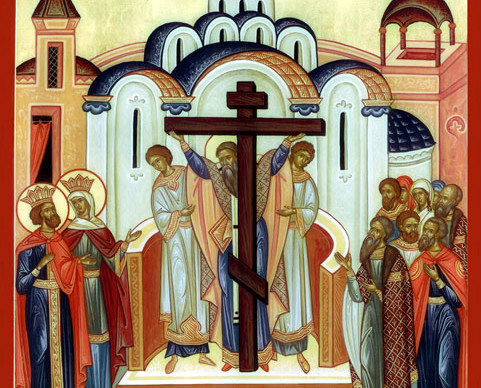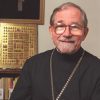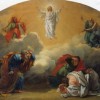Pontius Pilate didn’t understand.
“So you are a king, then?”, said Governor Pontius Pilate. Pilate understood none of this. He knew the Jews were expecting a new king of some sort. This could be dangerous. The Jews * had got rid of fake Messiahs before, but somehow they hadn’t stopped this one. Now here he was in Jerusalem, and a crowd had gathered wanting Pilate to take care of it. If this man really thought he was a king, Pilate needed to stop him lest he become a threat to law and order. His job was to keep these unfathomable excitable people under control.
- Quotations and paraphrases here are taken from John’s account in chapters 18 and 19. When he referred to “the Jews”, he meant the Jewish authorities, not all Jews.
So when Pilate couldn’t settle the crowd, he took Jesus into the Praetorium (the governor’s residence) and asked this very “un-kingly” man, mockingly, “Are you the king of the Jews?” Jesus  was evasive: “Are you saying this for yourself, or did others tell you this about me?” Pilate was annoyed: “What! Am I a Jew? Your own nation and the chief priests have delivered you to me. What have you done?”Jesus answered, “My kingdom is not of this world. If my kingdom were of this world, my servants would fight so that I should not be delivered to the Jews; but my kingdom does not come from here.”
was evasive: “Are you saying this for yourself, or did others tell you this about me?” Pilate was annoyed: “What! Am I a Jew? Your own nation and the chief priests have delivered you to me. What have you done?”Jesus answered, “My kingdom is not of this world. If my kingdom were of this world, my servants would fight so that I should not be delivered to the Jews; but my kingdom does not come from here.”
So he thinks he’s king of somewhere else? Bizarre. What am I dealing with? So Pilate again tried to draw him out: “So you are a king then?”Jesus again gave a nebulous answer: “You have said so.” That could mean yes, as in “You said it!”, or it could mean no, “You said it, not me.” Pilate was utterly perplexed. However, the man seemed harmless to him, not the rebellious type.
So he went out said to the Jews, “I find no fault in him at all”, and offered them a deal: “You have a custom that I should release someone to you at the Passover. Do you therefore want me to release to you the King of the Jews” or would you rather have the robber Barabbas?” They all cried, “Not this Man, but Barabbas!” Pilate thought to himself: This makes no sense at all.
He went back inside. He had an idea: Maybe if I make a fool of Jesus – make him look like a “loser” instead of a “winner”, as some now put it – the Jews will settle down and go away and leave me alone. So Pilate had the soldiers put a purple robe on Jesus and a crown of twisted t horns on his head, to humiliate him – “Hail, King of the Jews!” and they beat him. Pilate told the crowd, “I am bringing him out to you”, repeating “I find no fault in him”. Jesus now emerged wearing the purple robe and crown of thorns. “Behold the man”, cried Pilate. See what he is – saying far, far more than he knew. The Man, the only True Man who has ever lived.
horns on his head, to humiliate him – “Hail, King of the Jews!” and they beat him. Pilate told the crowd, “I am bringing him out to you”, repeating “I find no fault in him”. Jesus now emerged wearing the purple robe and crown of thorns. “Behold the man”, cried Pilate. See what he is – saying far, far more than he knew. The Man, the only True Man who has ever lived.
The Jews did not want to understand.
When the chief priests and officers saw him, they stirred up the crowd, crying, “Crucify Him!” Pilate, exasperated, said You do it yourself, and then for the third time, “I find no fault in him.” The Jews answered, “According to our law he ought to die, because he made himself the Son of God.” They would not consider even the possibility that… But now Pilate, who believed in the gods, became concerned. It isn’t likely, but one never knew: Is this strange man possibly son of a god? So he went again into the Praetorium and asked Jesus, “Where do you come from?” Jesus gave no answer. Now the Governor almost begged, “Don’t you know I have power to crucify you? power to release you?” Jesus responded, “You could have no power at all against me unless it had been given you from above. Therefore the one who delivered me to you has the greater sin.”
But that left Pilate with a lesser sin – was it against the gods? Now he sought to release him. The Jews would not have it, and they tried a new approach: “If you let this man go, you are not Caesar’s friend. Whoever makes himself a king speaks against Caesar.” Pilate decided to get this over quickly. He brought Jesus out again, and sat down in the judgment seat, prepared to release him. Now a message from his wife made Pilate even more fearful: “Have nothing to do  with that innocent man, for I have suffered a great deal today in a dream because of him.” Matthew 27:19
with that innocent man, for I have suffered a great deal today in a dream because of him.” Matthew 27:19
Pilate tried again to talk the Jews out of their fury. He said, “Behold your King!” Look at him! Surely you can see that this man is no king. Unbelievably, they cried again, “Crucify him. Crucify him!” Pilate mocked them: “Shall I crucify your king?” The chief priests answered, “We have no king but Caesar!” – this from those whose only true King was God! Utter blasphemy, and they knew it. Now Pilate was trapped. To allow this man, accused of treason, to go free might cost him his job. (And, as we see in modern politics, it is better to lie, cheat and steal than to lose one’s job.) So “when Pilate saw that he could not prevail, but rather that a riot was beginning, he took water and washed his hands of the whole thing, saying, ‘I am innocent of the blood of this just man. You see to it.’” Matthew 27:23 He then delivered their King over to them, with permission for him to be crucified, “and they led him away”.
 But, oddly, Pontius Pilate then ordered a sign to be placed on the Cross, in Hebrew, Greek and Latin, so no one could miss it: “JESUS OF NAZARETH, THE KING OF THE JEWS”. When the Jews objected, Pilate replied, “What I have written I have written.” Why did he do this? Was this one last “dig” at these uncontrollable people whom he didn’t understand? Was this his way of trying to assuage his guilt? Or was Pilate at some level beginning to believe? On the calendar of both the Coptic Orthodox Church of Egypt and the Abyssian Orthodox Church of Egypt, June 25 is the feast day of Saint Pontius Pilate! Judging by the rest of Pilate’s life, I kind of doubt that. But on the other hand…
But, oddly, Pontius Pilate then ordered a sign to be placed on the Cross, in Hebrew, Greek and Latin, so no one could miss it: “JESUS OF NAZARETH, THE KING OF THE JEWS”. When the Jews objected, Pilate replied, “What I have written I have written.” Why did he do this? Was this one last “dig” at these uncontrollable people whom he didn’t understand? Was this his way of trying to assuage his guilt? Or was Pilate at some level beginning to believe? On the calendar of both the Coptic Orthodox Church of Egypt and the Abyssian Orthodox Church of Egypt, June 25 is the feast day of Saint Pontius Pilate! Judging by the rest of Pilate’s life, I kind of doubt that. But on the other hand…
The world has never understood.
What kind of king is this? who ruled no nations, commanded no armies, who died as a criminal? who early on Holy Friday morning told his followers that he could command 12 legions of angels to come and save him, but he was not going to do it. A king who was satisfied with a crown of thorns. When Joseph Stalin was warned about the power of the Pope, he is said to have asked, “How many divisions does the Pope command?” Stalin did not understand.
What kind of kingdom was this? Jesus began his ministry with the words, “The Kingdom of God is among you”. But then instead of  setting up your normal kingdom, the Man went about healing and only teaching about the Kingdom of God. Even John the Baptist, before his death, began to wonder, “Are you the One who is to come or should we seek for another?” Jesus answered by describing his healing and teaching, all in accordance with prophecy, and concluded, “Blessed is the man who takes no offense in me.” Matthew 11 What kind of kingdom was this? After the Resurrection his apostles still didn’t get it. They asked him, “Lord, now will you restore the Kingdom to Israel?” His answer, in essence, was: None of your business. God will take care of that. Go about the work I gave you and don’t worry about it.
setting up your normal kingdom, the Man went about healing and only teaching about the Kingdom of God. Even John the Baptist, before his death, began to wonder, “Are you the One who is to come or should we seek for another?” Jesus answered by describing his healing and teaching, all in accordance with prophecy, and concluded, “Blessed is the man who takes no offense in me.” Matthew 11 What kind of kingdom was this? After the Resurrection his apostles still didn’t get it. They asked him, “Lord, now will you restore the Kingdom to Israel?” His answer, in essence, was: None of your business. God will take care of that. Go about the work I gave you and don’t worry about it.
This was no ordinary kind of Kingdom.
But Christians began to understand.
A few decades after the Resurrection, Saint Paul could see how the power of Christ’s Kingdom worked – how the Jews and the Romans, using ordinary “political” power, were trying to destroy the Church, and it wasn’t working. Christians, even to the point of death, didn’t give in to it. The Church was enduring. Paul wrote that “the message of the Cross is foolishness to those who are perishing, but to us who are being saved it is the power of God… We preach Christ crucified, to the Jews a stumbling block and to the Greeks foolishness, but to those who are called, both Jews and Greeks, Christ the power of God and the wisdom of God. Because the foolishness of God is wiser than men, and the weakness of God is stronger than men. …God has chosen the foolish things of the world to put to shame the wise, and God has chosen the weak things of the world to put to shame  the things which are mighty; and the base things of the world and the things which are despised God has chosen, and the things which are not, to bring to nothing the things that are.” I Corinthians 1:18ff
the things which are mighty; and the base things of the world and the things which are despised God has chosen, and the things which are not, to bring to nothing the things that are.” I Corinthians 1:18ff
Christ had said, “I have been given all authority in heaven and on earth”. Indeed he has been given all power and authority from before the beginning. As Word, Logos, λόγος of God, from eternity he has always been the Self-Expression of God, the Reason of God, the Power of God who orders and rules all things. It was just that he dared not speak of his Power till after his Resurrection, till after his apostles could begin to cope with the idea.
But there are different ways of exercising power and authority. Jesus Christ had chosen an unusual way.
“Hard Power” vs. “Soft Power”
These are terms from today’s pop political vocabulary, but the concepts are old. One contemporary politician describes Hard Power like this: “The source of power is fear”. Terrify people. Intimidate them, force them to do what you want. Don’t negotiate; threaten others into submission. Get control of them and make them do it. Some parents use this approach and some clergy, I’m sorry to say. Hard Power need not be overt: it can also consist of manipulating, or working on peoples’ guilt – any way to coerce people into doing what you want them to do, even if they don’t want to. This may work for a while, but if you want to know how it works in the long run… look around, or just wait. You parents, if you use  Hard Power, wait till your offspring get away from home, or wait and see how your grandchildren turn out. (At age 80, I have been around long enough to see this.) You tyrants and want-to-be tyrants, just wait till your people have a chance to rise up against you and overthrow you, or vote you out, or till your enemies get rid of you
Hard Power, wait till your offspring get away from home, or wait and see how your grandchildren turn out. (At age 80, I have been around long enough to see this.) You tyrants and want-to-be tyrants, just wait till your people have a chance to rise up against you and overthrow you, or vote you out, or till your enemies get rid of you
The other approach is called Soft Power. Do good to others. Set the example. Love them. Instead of coercing people, win them over, so they will want to follow you. “Do not be overcome by evil with evil, but overcome evil with good.” Romans 12:21This clearly was Christ’s way. OK, he did scare us occasionally – “where their worm does not die and the fire is not quenched.” But you know his was the power of love. There were 2 reasons for that:
1 God’s purpose in this world is to create beings who are like him, who freely, willingly, choose love, choose the good, choose him. And love cannot be forced. So Christ came to us and loved us to the end. – “Greater love has no man than that he should give up his life for his friends.” John 15:13 – and said “Come, follow me.” The apostles and the early Church continued Christ’s approach. They set the example and loved people into loving God. “Look how these Christians love one another.”
2 Though it takes longer to work, Soft Power has “staying power”. God “so loved the world”, and then he waited. And so Jesus still loves and waits on each of us. It you want evidence that the power of Jesus Christ works, how his  Kingdom of love triumphs: What has become of all the great powers of ancient times? Jesus Christ and his Church have outlasted every nation, king, empire, every human power, human philosophy and human system – the pagan Roman empire, Persians, Muslims, Mongols, Communists, Arians, Deists…, …, and we are about to outlast modern secularism. They all come and go, even the Christian kingdoms of the world. But Jesus Christ endures. His Church endures. When one nation loses faith, another gains it. On the evidence alone, he is unconquered and unconquerable.
Kingdom of love triumphs: What has become of all the great powers of ancient times? Jesus Christ and his Church have outlasted every nation, king, empire, every human power, human philosophy and human system – the pagan Roman empire, Persians, Muslims, Mongols, Communists, Arians, Deists…, …, and we are about to outlast modern secularism. They all come and go, even the Christian kingdoms of the world. But Jesus Christ endures. His Church endures. When one nation loses faith, another gains it. On the evidence alone, he is unconquered and unconquerable.
But even Christians have often misunderstood.
The Byzantines, who originally elevated the True Cross of Christ, often identified the Kingdom of God with their earthly political kingdom – forgetting that earthly kingdoms, even the best of them, are only pointers towards God’s Kingdom. Thank God for all the good things the Byzantine Empire gave us, but they were only a shadow of the Real Thing. No earthly kingdom lasts forever, and the fall of Constantinople was a wake-up call. Roman Catholics began to see the Papacy as eternally infallible, and God bless the holy popes, but on the whole we can see how that has turned out. To Tridentines it must be a shattering disappointment. Some American Evangelicals now seek political power designed to enforce God’s righteousness and make one kind of “Americanism” into the Kingdom of God on earth. Don’t do it, folks. You’re riding for a fall. I hope Russian Orthodox are not now heading into the same pitfall.
 Where is the Kingdom of God to be found on earth? In one place alone: “The Kingdom of God is at hand” where Jesus Christ is at hand. And he is at hand where he promised: in his One, Holy, Catholic and Apostolic Church – the Church as it was in apostolic times, neither adorned with nor dependent on any political power. Despite us sinners, the Church is the Kingdom of Christ, the colony of heaven on earth. “Our citizenship is in heaven, from which we also eagerly wait for the Savior, the Lord Jesus Christ.” Philippians 3:19. “Therefore let us go forth to him, outside the camp, bearing his reproach. For here we have no continuing city, but we seek the one to come.” Hebrews 13:13-14 By the word of the Lord, “death will never prevail against my Church” Matthew 16:18, because she is his Body, his continuing presence on earth of his eternal Kingdom. You can see that, despite all vicissitudes, Christ’s Holy Orthodox Church and her steady unchanging faith in him just go on and on.
Where is the Kingdom of God to be found on earth? In one place alone: “The Kingdom of God is at hand” where Jesus Christ is at hand. And he is at hand where he promised: in his One, Holy, Catholic and Apostolic Church – the Church as it was in apostolic times, neither adorned with nor dependent on any political power. Despite us sinners, the Church is the Kingdom of Christ, the colony of heaven on earth. “Our citizenship is in heaven, from which we also eagerly wait for the Savior, the Lord Jesus Christ.” Philippians 3:19. “Therefore let us go forth to him, outside the camp, bearing his reproach. For here we have no continuing city, but we seek the one to come.” Hebrews 13:13-14 By the word of the Lord, “death will never prevail against my Church” Matthew 16:18, because she is his Body, his continuing presence on earth of his eternal Kingdom. You can see that, despite all vicissitudes, Christ’s Holy Orthodox Church and her steady unchanging faith in him just go on and on.
The Elevation of the Holy Cross expressed it perfectly.
 That is why the Church’s feast of the Elevation of the Holy Cross over the world is no anachronism. Jesus Christ has ruled the world from the first day of Creation. He ruled when he hung dead on the Cross. He rules forever. And as a sign of this the Archbishop of Jerusalem, on September 14, 335, elevated the Cross of Christ for all the world to see. Generation after generation he conquers the hearts and minds and souls of men and women everywhere. Age after age he leads us into his eternal Kingdom. For he is “the Alpha and the Omega, the first and the last, the beginning and the end”. Revelation 22:13 “You, Lord, in the beginning laid the foundation of the earth, and the heavens are the work of your hands. They will perish but you will remain. They will all grow old like a garment. Like a cloak you will fold them up, and they will be changed. But you are the same, and your years will not fail.” Hebrews 1:10-12
That is why the Church’s feast of the Elevation of the Holy Cross over the world is no anachronism. Jesus Christ has ruled the world from the first day of Creation. He ruled when he hung dead on the Cross. He rules forever. And as a sign of this the Archbishop of Jerusalem, on September 14, 335, elevated the Cross of Christ for all the world to see. Generation after generation he conquers the hearts and minds and souls of men and women everywhere. Age after age he leads us into his eternal Kingdom. For he is “the Alpha and the Omega, the first and the last, the beginning and the end”. Revelation 22:13 “You, Lord, in the beginning laid the foundation of the earth, and the heavens are the work of your hands. They will perish but you will remain. They will all grow old like a garment. Like a cloak you will fold them up, and they will be changed. But you are the same, and your years will not fail.” Hebrews 1:10-12

















